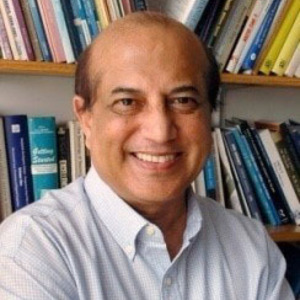News & Blog
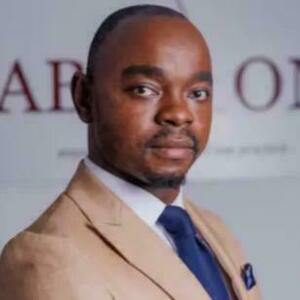
A conversation with Simbarashe Absolom Murondoti
A conversation with Simbarashe ‘Simba’ Absolom Murondoti, a 2023 Mandela Washington Fellowship at the University of Notre Dame alum who returned to campus in May to participate in the IDEA Center’s McCloskey New Venture Competition.
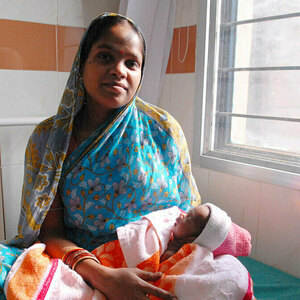
COVID-19 pandemic tied to low birth weight for infants in India, study shows
The incidence of low birth weight rose sharply in India amid the COVID-19 pandemic, according to new research from Santosh Kumar, associate professor of development and global health economics at Notre Dame’s Keough School of Global Affairs.
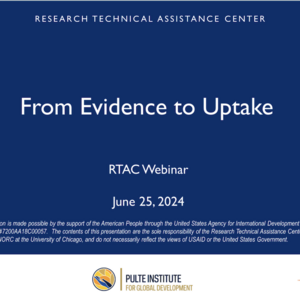
"From Evidence to Uptake" - A Webinar on Cross-National Writing and Research Communication
On June 25, Dr. Nancy Rydberg and Mr. Kevin Mann delivered a webinar for the Research Technical Assistance Center entitled "From Evidence to Uptake". During the presentation, Rydberg and Mann introduced the process that Notre Dame led, along with research partners, to carry out cross-national writing and research communications workshops.
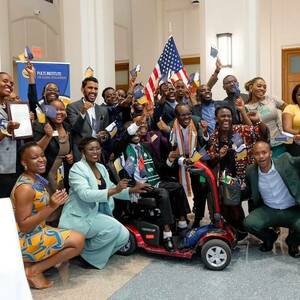
Pulte Institute Hosts 24 Mandela Washington Fellows
The 2024 Mandela Washington Fellows, 13 women and 11 men, come from 21 countries: Angola, Botswana, Burkina Faso, Burundi, Côte d'ivoire, Ghana, Kenya, Lesotho, Malawi, Mauritania, Mauritius, Namibia, Nigeria, Republic of the Congo, Rwanda, Senegal, Tanzania, The Gambia, Uganda, Zambia, and Zimbabwe. All of the Fellows share a common entrepreneurial spirit and have proven successes in promoting innovation and positive change in their professional and personal communities.
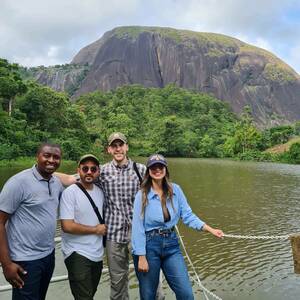
Updates from the Field: i-Lab Students in Nigeria
Sam Gadway, Saad Kamil, Muhindo Malunga, and Valentina Muñoz are in Nigeria to research social cohesion in NGOs and the private sector. Through the i-Lab program, Keough School Master of Global Affairs students spend a summer collecting and coding global development-related data in the field.
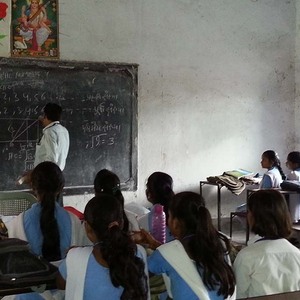
Seeking evidence-based policy, economist investigates how anemia impacts education for adolescents in India
In low- and middle-income countries, anemia reduction efforts are often touted as a way to improve educational outcomes and reduce poverty. A new study, co-authored by a Notre Dame global health economics expert, evaluates the relationship between anemia and school attendance in India, debunking earlier research that could have misguided policy interventions.
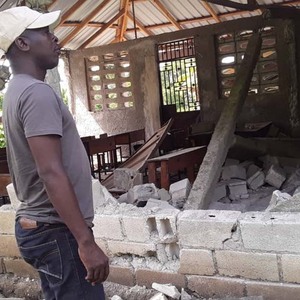
Notre Dame researcher champions local leadership for life-saving disaster assessment
The earthquake that struck southwest Haiti in August 2021 killed thousands of people and left more than half a million seeking help. New research by a University of Notre Dame expert finds that the assessment of this disaster can serve as a model for evaluating future disasters and making life-saving improvements.
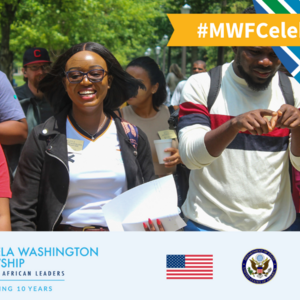
Celebrating Ten Years of Mandela Washington Fellowship at Notre Dame
In celebration of the 10th anniversary of the Mandela Washington Fellowship program at Notre Dame, we had the privilege of speaking with a few of our alums. They shared how the Fellowship at Notre Dame has profoundly impacted their lives, enabling them to use their experiences and knowledge to do extraordinary work in the world.
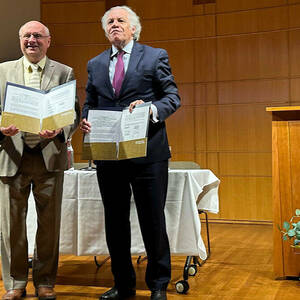
Keough School and Organization of American States partner to protect democracy and human rights
The University of Notre Dame’s Keough School of Global Affairs and the Organization of American States have launched a new partnership to strengthen democracy and defend human rights efforts across Latin America. To that end, the institutions will collaborate on joint research and policy projects, exchange faculty experts and train undergraduate and postgraduate students and researchers who work in development, human rights and democracy.
Recent Highlights
U.N. Secretary General António Guterres said at the COP28 climate summit in the UAE in November 2023 that the “earth’s vital signs are failing.” Along with world leaders, William J. Pulte Director Tracy Kijewski-Correa and Pulte Institute Core Affiliated Faculty Emily Grubert, Daniel C. Miller, and Paul Winters recently spoke about their research and how the urgency of their work becomes more evident every day as global warming exacerbates existing barriers to opportunities among the most vulnerable.
Water scarcity now threatens the health and development of communities around the globe. And climate change intensifies the problem, pushing governments to find more innovative, collaborative ways to address water stress. That’s why we need new metrics to monitor and assess Safe Water, Sanitation, and Hygiene or WASH interventions, says Pulte Institute Evidence and Learning Associate Director Danice Brown Guzmán.
The Pulte Institute takes a lead role in expanding Notre Dame’s research portfolio with federal agencies. Executive Director Michael Sweikar drew on his expertise in developing well-crafted proposals and offered this webinar hosted by LASER PULSE, with information on processes and procedures, policies and guidelines, and tips and tools to facilitate and support Grant Proposal Development.
As the University kicks off Walk the Walk Week with events designed to help us consider how we can take an active role in making Notre Dame more inclusive, we’re heeding the words of William J. Pulte Director Tracy Kijewski-Correa, who says, “The root of all that’s wrong in the world is that we value some lives less than others.” She explains that everyone, no matter their stature or status, brings something to the table.
On Earth Day 2023, Program Manager and Research Associate Lizzie Dolan says with climate change and historically irresponsible stewardship of water, we are increasingly facing barriers to having accessible, adequate, and acceptable water. One project the Pulte Institute is working on to supply safe water is the Sustainability and Human Rights Initiative, or SHRI, which offers states and corporations a research-based approach to fulfill this fundamental right.
